Key takeaways:
- Mental preparedness involves self-awareness, emotional regulation, and recognizing individual triggers to navigate life’s challenges effectively.
- Building a support network with understanding individuals and shared experiences fosters resilience and healing.
- Strategies such as visualization, journaling, and practicing gratitude can enhance daily mental resilience and create a proactive approach to emotional challenges.

Understanding mental preparedness
Mental preparedness is about equipping ourselves to handle life’s challenges, particularly when trauma enters the picture. I remember a time when I faced an overwhelming situation; it felt like my mind was racing but stuck in place at the same time. In moments like these, understanding what mental preparedness truly means can be a guiding light.
It’s not just about having strategies; it’s about being in tune with our emotions and recognizing our limits. When I found myself in a triggering environment, I realized that acknowledging my feelings was crucial. Do we tend to dismiss our emotional states, thinking they won’t affect our decisions? I’ve learned that our mindset shapes our actions more than we often acknowledge.
Moreover, mental preparedness isn’t a one-size-fits-all approach. Each journey is unique, and what works for one might not work for another. I’ve experimented with various techniques, from mindfulness to journaling, and found that prioritizing self-awareness genuinely helps in preparing my mind for unexpected turns. So, what does mental preparedness look like for you? Understanding that process can make a tremendous difference.
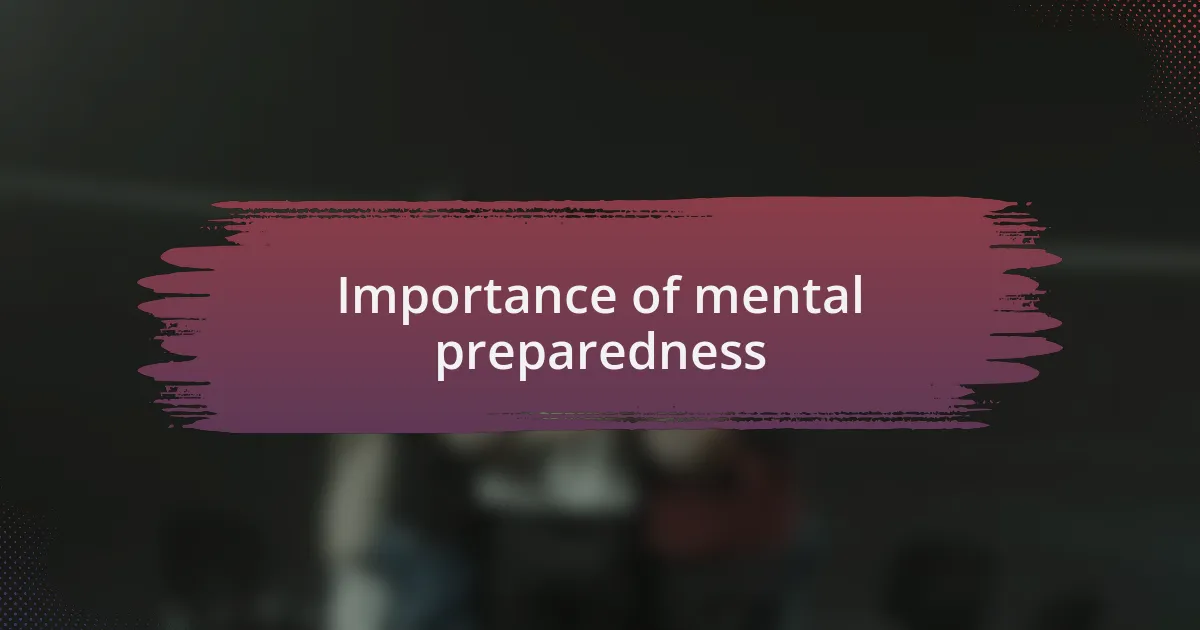
Importance of mental preparedness
Mental preparedness is foundational for navigating the complexities of life, especially in the aftermath of abuse. I recall a particularly difficult period when I had to face triggers that seemed insurmountable. During those times, I realized that preparing my mind ahead of challenges helped me stay grounded; it was like building a mental shield that allowed me to confront my emotions rather than be overwhelmed by them.
When I think about the importance of mental preparedness, I understand it goes beyond just survival—it’s about thriving despite adversity. The moments I spent journaling my thoughts and feelings were not merely expressions of frustration; they became a toolkit for understanding my reactions. Have you ever noticed how self-reflection can illuminate paths we didn’t see before? It truly changes the game, making us more resilient and adaptable.
Additionally, mental preparedness fosters a sense of control amid chaos. In my experience, there’s a certain empowerment in knowing I have strategies to draw upon when things get tough. I’ve often asked myself, “How can I better prepare for unexpected emotions?” This inquiry has guided my actions, allowing me to create a proactive approach to mental challenges. By embracing preparedness, we transform vulnerability into strength and give ourselves the best chance to heal and grow.
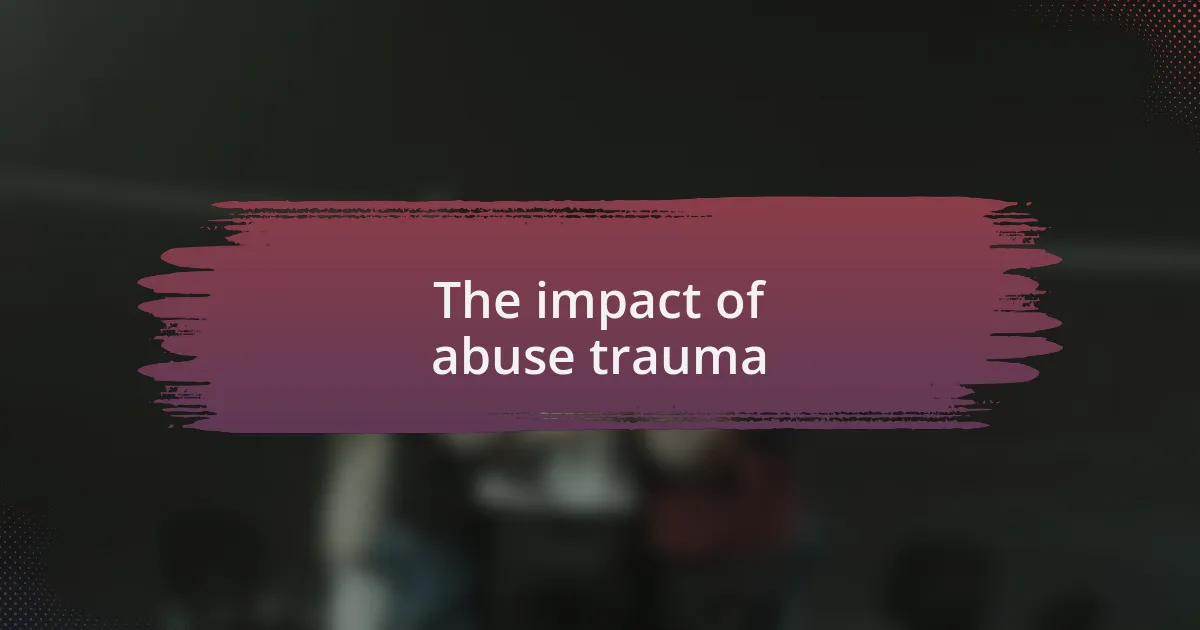
The impact of abuse trauma
The impact of abuse trauma can ripple through various aspects of a person’s life, often leaving deep emotional scars. I remember a friend who struggled with trust after experiencing betrayal; it was as if a shadow loomed over all her relationships. This struggle is common, as trauma can warp our perception of safety and connection, making it difficult to let anyone in.
Beyond emotional hurdles, physical manifestations of trauma are harder to ignore. For instance, I’ve encountered several individuals who, after surviving abuse, develop chronic anxiety or even autoimmune disorders. It’s intriguing how our mind and body communicate—trauma can lead to very real physical ailments, highlighting the need for comprehensive healing.
Have you ever considered how trauma affects decision-making? I often reflect on moments where I second-guessed my choices, driven by fear rather than clarity. This uncertainty can lead to missed opportunities and further isolation, illustrating how pervasive the impact of abuse trauma truly is. Understanding these effects strengthens our resolve to confront and address them head-on.
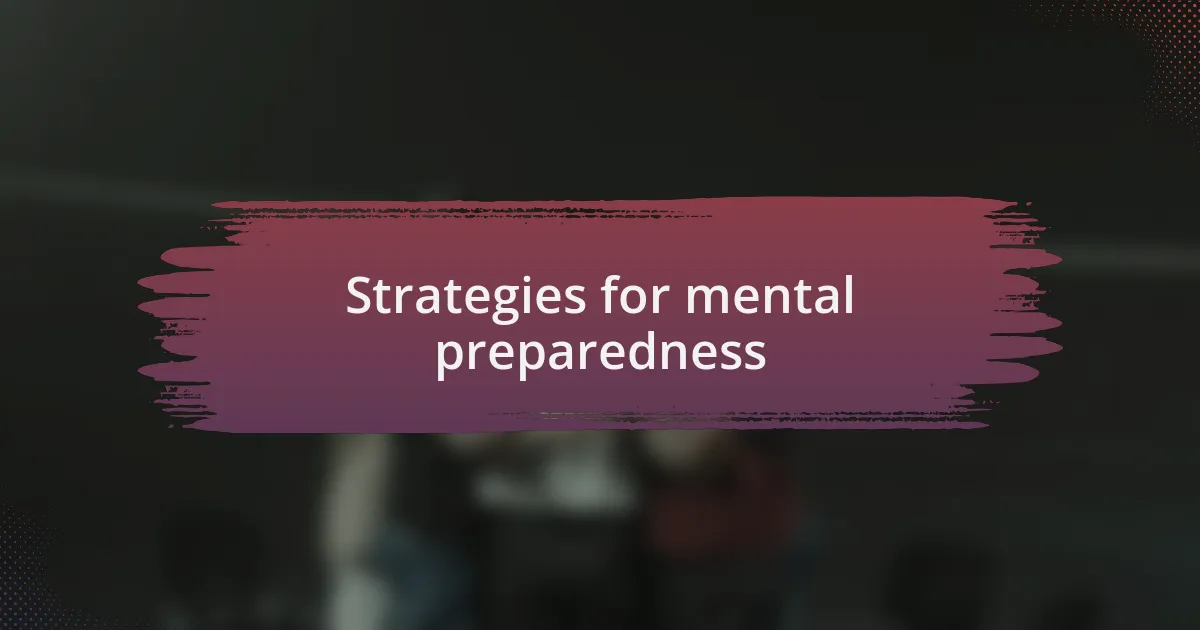
Strategies for mental preparedness
Mental preparedness starts with self-awareness. In my own journey, I found that taking a moment each day to check in with my feelings created a sense of grounding. This habit allowed me to recognize patterns or triggers before they overwhelmed me. Have you ever paused to really listen to what your emotions are telling you? It can be enlightening.
Another strategy that has proven effective is visualization. I often imagine myself navigating challenging situations before they happen. For example, when I faced a difficult conversation, visualizing the dialogue and my responses not only boosted my confidence but also prepared me for unexpected turns. This practice creates a mental roadmap, easing the anxiety that often accompanies uncertainty.
Additionally, building a support network is crucial for mental preparedness. It can be beneficial to reach out to trusted friends or support groups where understanding and shared experiences can foster resilience. I recall one evening spent sharing stories with fellow survivors; it was a reminder that I wasn’t alone in my struggles. Have you thought about who you can turn to for support? Identifying those connections can pave the way for healing and preparedness.
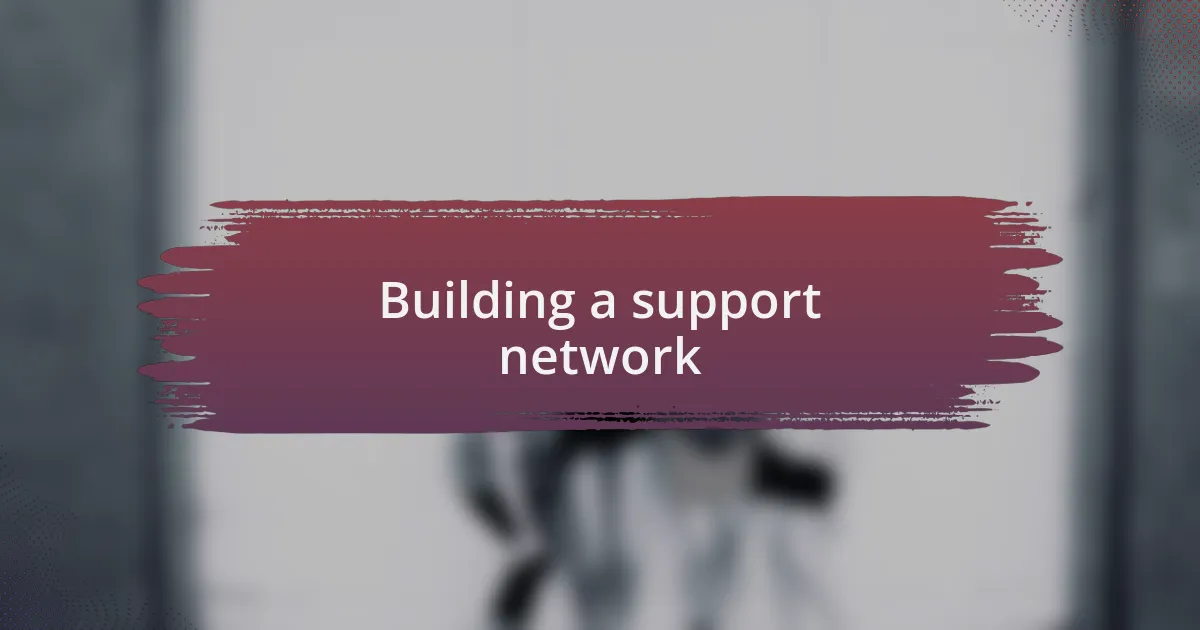
Building a support network
Building a support network often starts with finding individuals who truly understand your journey. I remember the first time I confided in a close friend about my trauma. The relief I felt as I shared my story was profound. It made me realize that having someone listen, truly listen, can be incredibly healing. Have you experienced that comforting feeling of being heard?
Connecting with others who have faced similar challenges is equally important. Joining a support group opened my eyes to the strength found in shared experiences. During our meetings, I noticed how each person’s story contributed to a collective sense of hope. It dawned on me that by sharing our struggles, we were not just validating our pain but also sparking resilience within each other. Who in your life might be part of your healing journey?
Lastly, nurturing these relationships is essential for sustained support. I have learned that reaching out regularly, even just to check in, can reinforce those bonds. It’s a simple gesture that reminds everyone involved that they are not alone. What steps can you take today to strengthen your own support network? Your journey toward mental preparedness is undoubtedly easier when you’re surrounded by understanding allies.
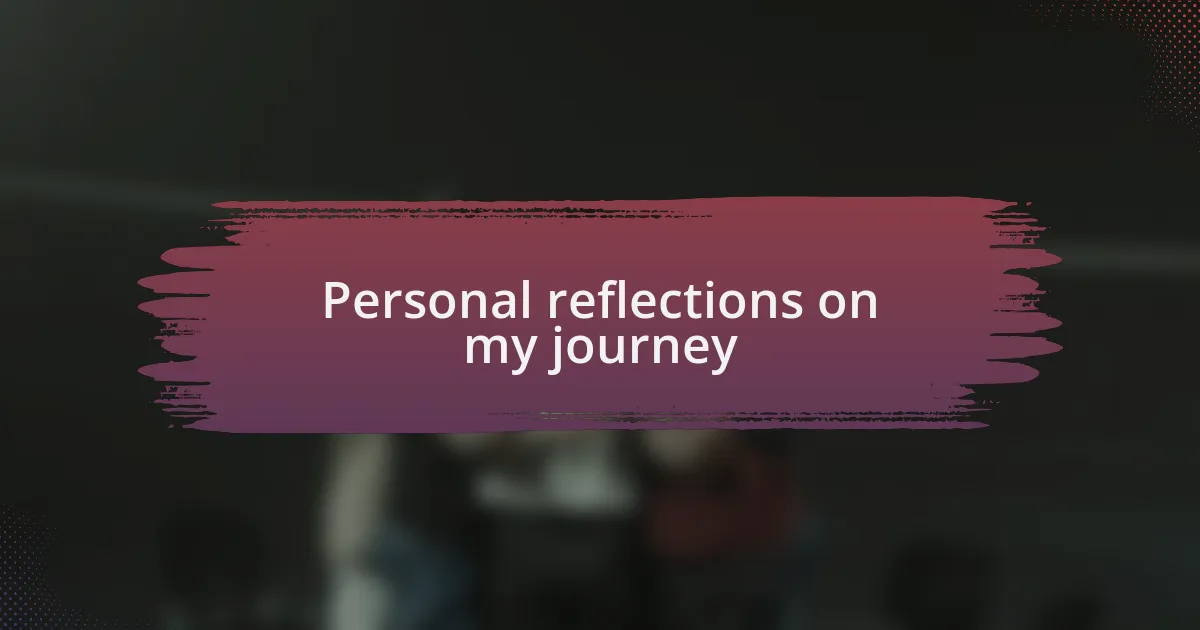
Personal reflections on my journey
Reflecting on my journey, I can recall moments when I felt truly lost in the depths of my trauma. I remember sitting alone in my room, wrestling with overwhelming emotions and wondering if I would ever find my way back to myself. It wasn’t until I began to embrace mental preparedness that I discovered the importance of self-awareness and emotional regulation. How do you navigate your emotions when they feel too heavy to bear?
I once had an eye-opening experience while journaling. As I poured my thoughts onto the pages, I started to notice patterns in my feelings and reactions. This process allowed me to confront long-buried fears, and in doing so, I felt a sense of empowerment. It was as if I was taking the first step toward reclaiming my narrative. Have you ever tried journaling as a tool for self-discovery? It might just surprise you with the clarity it brings.
Finding moments of stillness became a critical part of my healing. I learned the power of meditation and mindfulness, where just a few minutes of focusing on my breath made a world of difference. In that tranquility, I encountered layers of myself that I had previously ignored, and it sparked a curiosity to delve deeper. What practices do you find grounding? Engaging in these activities truly transformed my perspective on mental health, turning turmoil into a pathway for growth.
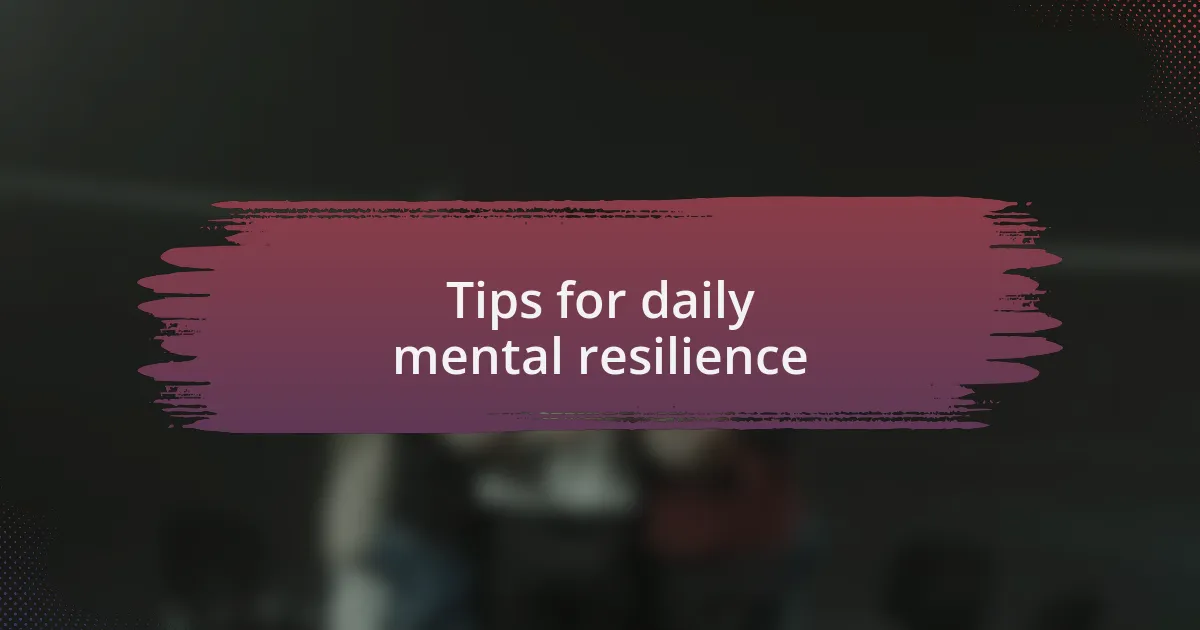
Tips for daily mental resilience
The mornings can be a battlefield, especially when dealing with the aftermath of trauma. I remember setting aside just five minutes each day to visualize my intentions. As I closed my eyes and envisioned how I wanted to approach the day, I felt a newfound sense of control creeping in. Have you ever tried this simple practice? I found that starting my day with purpose helped me brace myself against the waves of negative emotions that might otherwise crash in.
One practice that I still hold dear is the power of gratitude. I started a gratitude jar, adding a note each time I recognized something positive in my life, no matter how small. One note read, “I took a walk and noticed the vibrant colors of the leaves.” It was these little acknowledgments that gradually shifted my focus from pain to appreciation. What if you took a moment each day to reflect on small victories? I assure you, it cultivates a resilience that strengthens over time.
Establishing a routine can significantly bolster mental resilience. I experienced this firsthand when I began setting specific times for self-care activities, like reading or engaging in creative hobbies. Sticking to these routines became a lifeline, especially on days when my mind felt clouded. How has structure influenced your mental well-being? Embracing a routine not only provided stability but also reminded me of my commitment to my own healing journey.